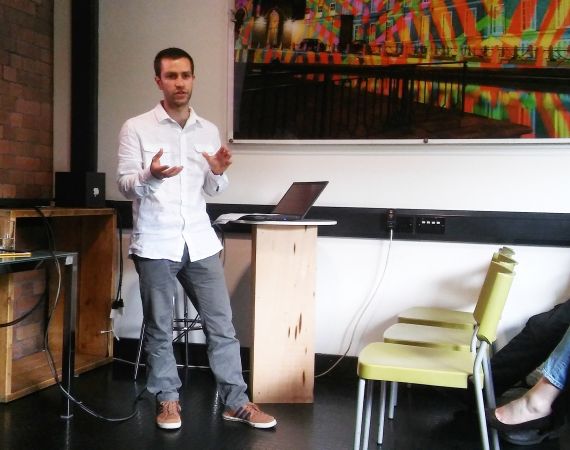Lunchtime talk write-up
Posted on Fri 12 May 2017
Meal Plans
David Lisser is an artist based in Newcastle upon Tyne, and over the next three months he will be working between Newcastle and the Pervasive Media Studio on a new research-led project called Meal Plans.Meal Plans imagines the future of food as if it were history, and David will work alongside…

Speaker
David Lisser is an artist based in Newcastle upon Tyne, and over the next three months he will be working between Newcastle and the Pervasive Media Studio on a new research-led project called Meal Plans.
Meal Plans imagines the future of food as if it were history, and David will work alongside studio residents, futurologists and archaeologists to create pseudo-artefacts and a speculative narrative that will present us with a possible future-history.
His practice concerns tools, technology and our notions of the future, and he makes sculptures that explore their impact on the way we work, communicate, eat and live. David spoke to us about his past work, how this influences his practice, as well as what he hopes to do in future.
Five Things I Learned:
1. David creates sculpture and installations using materials such wood, plaster, metal and …..bread? After studying Fine Art, David graduated with a series of mock Victorian contraptions or wishing machines, including a prepared piano with wish bones attached to each key and a portable wishing well. He has been based in Newcastle for the last 12 years and is a long-standing member of the Newbridge Project.
2. Through Visual Arts in Rural Communities David explored his first food related project in 2010 when he stayed in Tarset, Northhumberland; a village with a population of just 190. He spoke with residents about how food supplies to the village had been cut off several times in the past due to harsh winters. He discovered through conversation that the sharing of food within the village cultivated a sense of community. The impact food can have on a social level can help people to interact with each other and break down barriers. His resulting piece The Breaking of Bread literally put these ideas into practice. David baked many loaves of bread and walled himself into a small house. Visitors were encouraged to take a loaf as they passed until the barrier was completely gone, opening the way to a table set for dinner inviting people to join and have conversations surrounding food.
3. David worked on another food related project in the remote village of Pennine as an artist in residence at Allenheads Contemporary Arts. As a response to conversations with the locals about food scarcity and the abundance of midges, David went on to produce midge burgers. David explained the taste of the burgers, which apparently were quite dry due to the lack of fat in midges and salty in taste. The Pennine consensus was that it’s a better alternative to cannibalism.
4. This project inspired a pseudo-history piece about a midge eating nomadic tribe in Pennine. David created a whole history narrative by making midge processing equipment and an installation of a midge catchers house. This led to David creating more artefact style contraptions.
5. Meal Plans will explore the future of food from the perspective of a fictional future historian. David will be undergoing an intensive period of research here at the studio looking at everything between water security, lab-grown meat, vertical agriculture, autonomous kitchen appliances and new eating habits. Where possible David will try to weave in some truths, such as the development of the wooden spoon.
David's aim at the moment is to create a museum or archaeological style exhibition of pseudo-artefacts and fragments of future relics, with accompanying text that will be shown at At-Bristol this September. You can find out more about his work here.